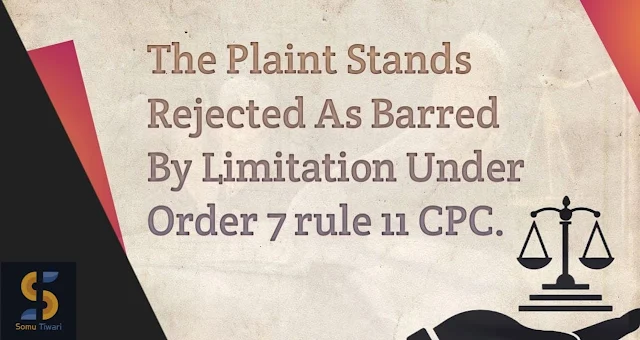Rejection Of Plaint Barred By Limitation
In
a significant judgment, the Supreme Court set aside the judgment and order
dated 08.02.2024 passed by the High Court and restored the decision of the
Trial Court which rejected a plaint under Order VII Rule 11(d) of Code of Civil Procedure, 1908 (CPC) as barred by limitation. The Supreme Court held that
 |
| Rejection Of Plaint Barred By Limitation |
The
Supreme Court held, the suit was filed in 2017. It was ex-facie barred by the
limitation period, which did not require the parties to produce any evidence. In
the present case, the issue limitation is purely an issue of fact and
allegation stands concluded on the basis of admitted facts as per the plaint
for which no evidence is required.
The Court further stated that if the main relief in the plaint is barred by the limitation period, then the plaint can be rejected in toto even if cause of action for ancillary relief was within period of limitation.
Brief Facts
The
Brief facts of the case is that the plaintiff had filed a suit in the City
Civil Court, Ahmadabad against four persons as defendants in which seeking
direction from the Court to declare the Will in February 2014 executed by his
late father and the codicil in September 2014 and all consequential deeds
thereof as null and void and also to grant a permanent injunction
restraining the defendants from entering into any transaction in pursuance of
the aforesaid will and codicil.
Thereafter,
the defendants moved an application under Order VII Rule 11 of the CPC for
rejection of the plaint that the plaintiff had not pleaded any claim in respect
of the suit that it is within the period of limitation and that it is primary
duty of the plaintiff to show that the suit was instituted within the period of
the limitation. In the absence of such pleadings the pliant is liable to be
dismissed under Order VII Rule 11 CPC.
The
Learned Trail court stated that as per the statements made by the plaintiff, he
came to know about the will and codicil in November, 2014, in view of section
58 of the Limitation Act, 1963. The court further stated that the suit should
have been filed within three years when the right to the suit was first
acquired. Since the suit was not filed within three years. It is clearly barred
by limitation period. Accordingly, the
trail Court allowed the application and dismissed the plaint under Order VII
rule 11 CPC.
Aggrieved
by this order, the plaintiff challenged the above judgment and order before the
High court. However the aforesaid judgment and order was reversed by the High
Court and said that the parties ought to have been permitted to lead evidence
on the point of limitation and that the plaint was not liable to be rejected in
part, as apart from seeking for declaration of the Will and Codicil as null and
void, other reliefs were also sought in the plaint.
Legal Issues
Where
the issue of limitation is purely an issue of fact and admitted in the plaint,
in such circumstances the suit must be dismissed as being barred by limitation,
the argument that limitation is a mixed question of law and fact has no
substance.
 |
| Rejection Of Plaint Barred By Limitation |
Court’s Reasoning
The
Supreme Court observed that the relief of declaration claimed in the present
suit does not fall within the scope of under Articles 56 and 57. Therefore, Article
58 would apply, which provides a limitation period of three years for obtaining
a declaration other than the declaration mentioned under Articles 56 and 57. It
provides that for such a declaration, the limitation period is three years from
the date of when the cause of action first arose.
The Court held that according to the plaintiff’s statement the knowledge of
the Will and Codicil in the first week of November, 2014 but that was not full
knowledge. Considering this submission, the Appellate Court made a distinction
between “having knowledge” and “full knowledge” and held that the suit is not
barred by the limitation period as the limitation period will be reckoned from
the date of full knowledge.
The
Supreme Court further held that it is total fallacy to make any distinction
between “knowledge”and "full knowledge”. Firstly, the limitation period should
run from the date when the cause of action first accrued and not from any subsequent
date for the cause of action. According to the plaintiff, the cause of action
for the suit arose much earlier and the plaintiff has not produced any date on
which he had full knowledge.
Conclusion
The Supreme Court held, “the suit was filed in 2017. It was ex-facie barred by the
limitation period, which did not require the parties to produce any evidence. In
the present case, the issue limitation is purely an issue of fact and
allegation stands concluded on the basis of admitted facts as per the plaint
for which no evidence is required.
The
Supreme Court held that if the main relief in the plaint is barred by the
limitation period, the plaint can be rejected in entirety even though cause of
action for ancillary relief was within period of limitation.
Accordingly,
the appeal is allowed.
Case Title: - Nikhila Divayang Mehta & Anr. vs. Hitesh P. Sanghvi & Ors. 2025(2) Law Herald (SC) 1287
Read More:








.png)
Post a Comment